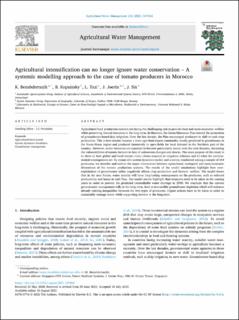| dc.contributor.author | Benabderrazik, Kenza | |
| dc.contributor.author | Kopainsky, Birgit | |
| dc.contributor.author | Tazi, L. | |
| dc.contributor.author | Jörin, Jonas | |
| dc.contributor.author | Six, Johan | |
| dc.date.accessioned | 2022-03-18T14:31:58Z | |
| dc.date.available | 2022-03-18T14:31:58Z | |
| dc.date.created | 2021-09-23T09:14:08Z | |
| dc.date.issued | 2021 | |
| dc.identifier.issn | 0378-3774 | |
| dc.identifier.uri | https://hdl.handle.net/11250/2986256 | |
| dc.description.abstract | Agricultural-food production systems are facing the challenging task to provide food and socio-economic welfare while preserving natural resources in the long-term. In Morocco, the Green Moroccan Plan steered the promotion of groundwater-based drip irrigation. Over the last decade, the Plan encouraged producers to shift to cash crop production. This is how tomato became a main agri-food export commodity mostly produced in greenhouses in the Souss-Massa region and produced intensively in open-fields for local demand in the Northern part of the country. However, water resources are expected to become particularly scarce over the next decades, increasing the vulnerabilities of tomato farmers in face of unforeseen changes and shocks. The main purpose of this study is to show a) how global and local tomato value chains respond to irrigation schemes and b) what the environmental consequences are. By means of a system dynamics model, and a survey conducted among a sample of 244 producers, we describe and outline the major interactions between agricultural, ecological and socio-economic dimensions of the tomato production systems. The results of the model simulations highlight how overexploitation of groundwater tables negatively affects crop production and farmers’ welfare. The model shows that in the near future, water scarcity will have long-lasting consequences on the producers, such as reduced productivity and losses in cash flow. Our model results highlight that measures need to be taken in the coming years in order to prevent the predicted irremediable water shortage in 2030. We conclude that the current groundwater management will, in the long-term, lead to irreversible groundwater depletion which will enhance already existing inequalities between the two types of producers. Urgent actions have to be taken in order to sustainably manage water while supporting farmers in the long-term. | en_US |
| dc.language.iso | eng | en_US |
| dc.publisher | Elsevier | en_US |
| dc.rights | Navngivelse 4.0 Internasjonal | * |
| dc.rights.uri | http://creativecommons.org/licenses/by/4.0/deed.no | * |
| dc.title | Agricultural intensification can no longer ignore water conservation – A systemic modelling approach to the case of tomato producers in Morocco | en_US |
| dc.type | Journal article | en_US |
| dc.type | Peer reviewed | en_US |
| dc.description.version | publishedVersion | en_US |
| dc.rights.holder | Copyright 2022 the authors | en_US |
| cristin.ispublished | true | |
| cristin.fulltext | original | |
| cristin.qualitycode | 1 | |
| dc.identifier.doi | 10.1016/j.agwat.2021.107082 | |
| dc.identifier.cristin | 1937422 | |
| dc.source.journal | Agricultural Water Management | en_US |
| dc.source.pagenumber | 107082 | en_US |
| dc.identifier.citation | Agricultural Water Management. 2021, 256, 107082. | en_US |
| dc.source.volume | 256 | en_US |

